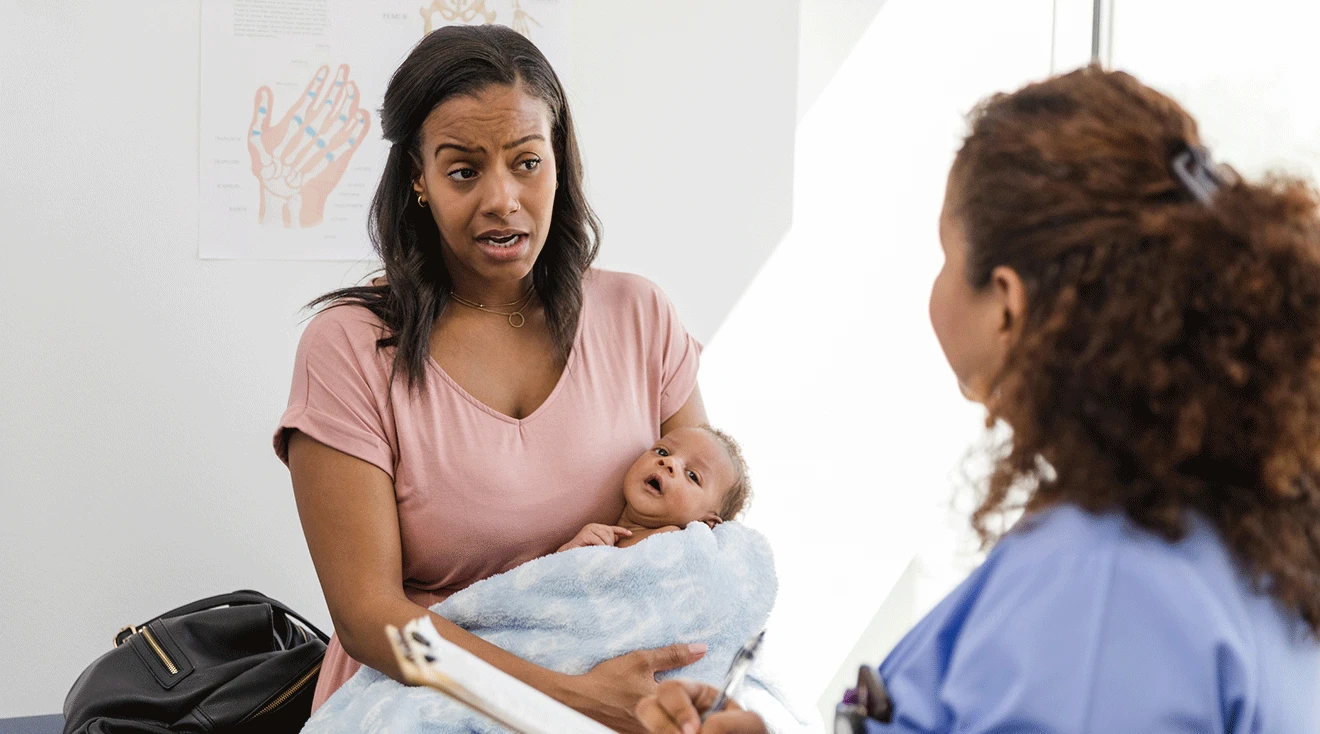What to Expect at Your Postpartum Checkups
During pregnancy, you likely got used to seeing your OB or midwife fairly often, especially as you neared your due date. Consistent visits are a standard part of prenatal care to ensure everything is progressing smoothly and that you and baby are healthy. So what happens now that baby is born? In the past, prenatal care has been far more thorough than postpartum care, but in recent years experts have called for a change. Giving birth is no small feat—it takes both a physical and emotional toll, and new moms need medical care and support, starting with their first postpartum checkup. Here, we talked to two experts to lay out everything you need to know about postpartum checkups, from when to expect them to how to prepare.
Postpartum checkups are the visits to your OB or midwife that you’ll have after giving birth—and they’re just as important as your prenatal visits, as the first few weeks after delivery are a time of major transition for both you and baby.
During these checkups, your doctor will want to make sure you’re adapting well emotionally and recovering well physically. “Issues with blood pressure, infections, breastfeeding issues and hormonal imbalances can all happen postpartum,” says Rebekah Mustaleski, a certified professional midwife and compression director with Motif Medical. “It’s often hard to recognize the subtle differences that signal some of these issues because a new parent is consumed with caring for their newborn. It’s essential to be seen by your doctor or midwife so that they can do an assessment and make sure that your postpartum recovery is going smoothly.”
It used to be that you’d have one postpartum checkup, typically six weeks after giving birth or sooner if you delivered via c-section. However, in recent years, experts have called for postpartum checkups to happen sooner and more frequently. The American College of Obstetricians and Gynecologists (ACOG) now recommends that postpartum care start no later than within the first three weeks after birth and should be followed by ongoing care as needed. “To optimize the health of women and infants, postpartum care should become an ongoing process, rather than a single encounter, with services and support tailored to each woman’s individual needs,” the guidance reads. Plus, the ACOG states women should receive a comprehensive postpartum checkup that includes “a full assessment of physical, social and psychological well-being” no later than 12 weeks postpartum.
According to Mustaleski, most providers schedule postpartum checkups the day after birth (where they’ll come see you bedside as you recover), two to three weeks postpartum and then again at six to eight weeks postpartum.
The postpartum checkups are a time to discuss how you’re healing and adapting to motherhood. During the visit, your doctor will check on several aspects of your physical and emotional recovery. According to the ACOG, it will also cover infant care and feeding, family planning, sleep and fatigue, chronic disease management and health maintenance.
“I usually talk to my patients about how the pregnancy and delivery went," says Laura Riley, MD, department chair of obstetrics and gynecology at Weill Cornell Medicine. She also asks how infant feeding is going, whether Mom has any questions about returning to work and when is a good time to resume exercise.
Postpartum checkups: Physical recovery
During the physical checkup, your doctor or midwife will check your vitals, assess your weight and take your blood pressure. According to Mustaleski and Riley, they’ll also:
- Check your breasts for lumps and abnormal discharge
- If you’re breastfeeding, make sure your ducts aren’t clogged and you don’t have an infection
- Look at your abdomen for returning muscle tone
- Do a pelvic exam to see if your uterus is returning to its normal pre-pregnancy size and that the cervix is closed
- For c-section deliveries, make sure the incision is healing well and has no signs of infection
- Check how well any episiotomy or laceration has healed
- Administer any lab tests they think are necessary (such as a blood count if you lost a lot of blood during birth)
- Ask about your postpartum bleeding
- Ask about your pelvic floor recovery and refer you to a pelvic floor physical therapist, if needed
If you’re having excessive pain, bleeding or problems with an incision, definitely tell your doctor, Riley says.
Postpartum checkups: Family planning
Another big item to cover during your postpartum checkups is birth control options. According to Riley, risk of complications in any subsequent pregnancy goes down if you wait at least 12 months after giving birth to conceive again. (The ACOG recommends ideally waiting at least 18 months.) Just because you’re breastfeeding and not menstruating yet doesn’t mean you can’t get pregnant. (After all, you ovulate before your first postpartum period arrives!) Your provider should discuss when you can safely start having sex again and talk you through your family planning options.
“It may seem like it’s too soon for that discussion, but some people do show up to their six-week postpartum appointment and find out they’re pregnant again!” Mustaleski explains, adding, “At your six- to eight-week postpartum appointment, many providers will do a Pap smear, if you’re due to have one done.”
Postpartum checkups: Emotional recovery
While physical recovery is certainly important, your doctor will also want to check in on how you’re coping with the transition to motherhood. During the visit, expect to answer questions about your mood, sleeping patterns and other aspects of your emotional well-being.
One big thing providers look for are signs of postpartum depression, which up to 15 percent of women experience, according to the American Pregnancy Association. The most common assessment is the Edinburgh Postnatal Depression Scale. “It’s a series of 10 questions that gives your doctor or midwife an overview of how you’re doing emotionally over the last seven days,” Mustaleski says. “If your score indicates that you’re experiencing postpartum depression, your doctor or midwife will discuss treatment options with you to help you start feeling your best as soon as possible.”
When you’re exhausted and sore, getting yourself out of the house for a postpartum checkup may seem daunting—but remember, these critical visits are set up to ensure your health and well-being.
Since this post-pregnancy stuff is completely new to you—the aches, the pains, the emotions—be sure to track and flag any symptoms you’re worried about, and write down all your questions beforehand. “Most new parents are functioning on minimal sleep, so attempting to recall your questions in the moment is difficult,” Mustaleski says. Her advice? Start a list on your phone that you can easily bring with you to the appointment. Your questions might touch on the topics mentioned above, plus:
- How your delivery went
- Baby’s safety
- Physical activity and exercise goals
- Breastfeeding or formula-feeding
- Returning to pre-pregnancy activities
- Body changes or new pains (pay attention to worsening pressure in your vagina, difficulty with bowel movement and inability to fully empty your bladder, Mustaleski says)
Make sure to also note any additional support you feel you need, such as a lactation consultant, pelvic floor therapist, mental health therapist or other professional.
As you prepare for a postpartum checkup, remember to also plan for childcare if baby won’t be coming with you to the appointment. That said, “Many midwives will do a well-baby check up at the same time as your postpartum visit, so you can also ask if that is an option with your provider,” Mustaleski notes. If you do end up bringing baby to the appointment, remember to pack a change of clothes, diapers, wipes, burp cloths, pacifiers (if baby is using them) and an extra bottle if baby’s not breastfeeding.
Postpartum checkups can be a lot to take in, but they’re ultimately designed to support you. Come prepared with any and all questions! “The postpartum is a time of in-between—you aren’t pregnant anymore, but you aren’t back to your everyday life,” Mustaleski says. “If you have questions about what is okay or safe for you to do during that transition, ask your provider to give you guidance on how to safely help your body recover.”
Please note: The Bump and the materials and information it contains are not intended to, and do not constitute, medical or other health advice or diagnosis and should not be used as such. You should always consult with a qualified physician or health professional about your specific circumstances.
Laura Riley, MD, is a board-certified obstetrician who specializes in high risk pregnancies. She serves as the department chair of obstetrics and gynecology at Weill Cornell Medicine, as well as the obstetrician and gynecologist-in-chief at NewYork-Presbyterian/Weill Cornell Medical Center, based in New York City. She received her medical degree and completed her residency at the University of Pittsburgh School of Medicine.
Rebekah Mustaleski, CPM-TN, IBCLC, is a certified professional midwife specializing in evidence-based maternity care. She cofounded Roots & Wings Midwifery in Knoxville, Tennessee. Mustaleski received her bachelor’s degree in psychology from Centre College and worked as a doula and birth photographer prior to establishing Roots & Wings.
Learn how we ensure the accuracy of our content through our editorial and medical review process.
Navigate forward to interact with the calendar and select a date. Press the question mark key to get the keyboard shortcuts for changing dates.





















































